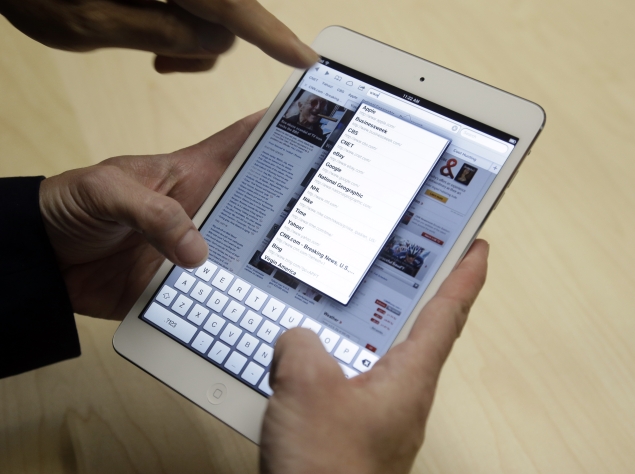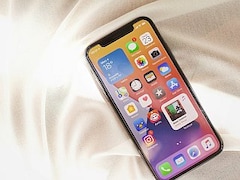- Home
- Internet
- Internet News
- US paints Apple as 'Ringmaster' in ebook price fixing
US paints Apple as 'Ringmaster' in ebook price-fixing

According to the Justice Department, that email is part of the evidence that Apple was the "ringmaster" in a price-fixing conspiracy in the market for e-books, a more direct leadership role than originally portrayed in the department's April 2012 antitrust lawsuit against Apple and five publishing companies.
In its suit, the government said that Apple and the publishers conspired to fix e-book prices as part of a scheme to force Amazon to raise its e-book price from a uniform $9.99 to the higher level noted by Jobs in the email, which publishers wanted. That, the department said, resulted in higher prices to consumers and ill-gotten profits for Apple and its partners.
The email was released on Tuesday as part of the government's filing before the trial in the case, set to begin on June 3 in New York.
Two days after Jobs' email to Murdoch, HarperCollins, the publishing company owned by News Corp., signed an agreement with Apple to force all sellers of electronic books to adopt the new pricing model, the government said.
Apple is the only defendant left in the lawsuit after five publishing companies - Hachette, HarperCollins, Macmillan, Penguin and Simon & Schuster - agreed last year and earlier this year to settle the charges.
Tom Neumayr, a spokesman for Apple, said the company did not conspire to fix prices on e-books.
"We helped transform the e-book market with the introduction of the iBookstore in 2010, bringing consumers an expanded selection of e-books and delivering innovative new features," Neumayr said. "The market has been thriving and innovating since Apple's entry, and we look forward to going to trial to defend ourselves and move forward."
The Justice Department's latest filings in the case also paint a picture of an Apple willing to use its power in mobile apps to strong-arm reluctant partners. That is especially evident in the accusations the department makes about Apple's dealings with Random House, the last major publisher to resist striking an e-books deal with Apple.
In July 2010, Jobs, Apple's former chief executive, told the chief executive of Random House, Markus Dohle, that the publisher would suffer a loss of support from Apple if it held out much longer, according to an account of the conversation provided by Dohle in the filing. Two months later, Apple threatened to block an e-book application by Random House from appearing in Apple's App Store because it had not agreed to a deal with Apple, the filing said.
After Random House finally agreed to a contract on Jan. 18, 2011, Eddy Cue, the Apple executive in charge of its e-books deals, sent an email to Jobs attributing the publisher's capitulation, in part, to "the fact that I prevented an app from Random House from going live in the app store," the filing reads.
The newly released documents also quote David Shanks, chief executive of Penguin, as saying that Apple was the "facilitator and go-between" for the publishing companies in arranging the agreement.
And the documents quote Dohle as saying that an Apple executive counseled him that the publishing company could threaten to withhold e-books from Amazon to force Amazon to accept the higher prices. Random House was not named as a defendant in the lawsuit.
The price-fixing suit charges that Apple advised publishers to move from a wholesale pricing model, which let retailers charge what they wanted, to a system that allowed publishers to set their own e-book prices, a model known as agency pricing.
The publishers said Amazon was pricing e-books below their actual cost, putting financial pressure on the publishers that they said would drive them out of business. The dispute underscored the extent to which competition from digital retailers like Amazon was transforming the traditional book industry.
Three of the publishers, HarperCollins, Simon & Schuster and Hachette, settled with the government immediately. Penguin, Macmillan and Apple originally decided to fight the charges. But in December, to clear the way for its merger with Random House, Penguin settled, followed by Macmillan in February.
The settlements call for the publishers to lift restrictions imposed on discounting and other promotions by e-book retailers. The companies are also prohibited from entering into new agreements with similar restrictions until December 2014.
The publishers must also notify the government in advance about any e-book ventures they plan with each other, and they are prohibited for five years from agreeing to any kind of so-called most-favored-nation clause with any retailer, which establishes that no other retailer is allowed to sell e-books for a lower price.
© 2013, The New York Times News Service
For the latest tech news and reviews, follow Gadgets 360 on X, Facebook, WhatsApp, Threads and Google News. For the latest videos on gadgets and tech, subscribe to our YouTube channel. If you want to know everything about top influencers, follow our in-house Who'sThat360 on Instagram and YouTube.
Related Stories
- Galaxy S24 Series
- MWC 2024
- Apple Vision Pro
- Oneplus 12
- iPhone 14
- Apple iPhone 15
- OnePlus Nord CE 3 Lite 5G
- iPhone 13
- Xiaomi 14 Pro
- Oppo Find N3
- Tecno Spark Go (2023)
- Realme V30
- Best Phones Under 25000
- Samsung Galaxy S24 Series
- Cryptocurrency
- iQoo 12
- Samsung Galaxy S24 Ultra
- Giottus
- Samsung Galaxy Z Flip 5
- Apple 'Scary Fast'
- Housefull 5
- GoPro Hero 12 Black Review
- Invincible Season 2
- JioGlass
- HD Ready TV
- Laptop Under 50000
- Smartwatch Under 10000
- Latest Mobile Phones
- Compare Phones
- Huawei Pura 70 Pro+
- Huawei Pura 70 Ultra
- Tecno Camon 30 Premier 5G
- Motorola Edge 50 Fusion
- Oppo A1i
- Oppo A1s
- Motorola Edge 50 Ultra
- Leica Leitz Phone 3
- Asus ZenBook Duo 2024 (UX8406)
- Dell Inspiron 14 Plus
- Realme Pad 2 Wi-Fi
- Redmi Pad Pro
- Cult Shock X
- Fire-Boltt Oracle
- Samsung Samsung Neo QLED 8K Smart TV QN800D
- Samsung Neo QLED 4K Smart TV (QN90D)
- Sony PlayStation 5 Slim Digital Edition
- Sony PlayStation 5 Slim
- IFB 2 Ton 3 Star Inverter Split AC (CI2432C323G1)
- Daikin 1 Ton 3 Star Inverter Split AC (FTKL35UV16W+RKL35UV16W)

















